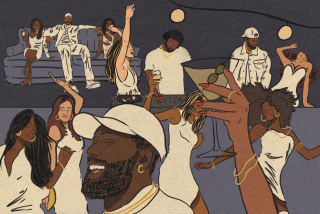Destined to be a beat reporter
- Share via
He was 10 years old when the beat first grabbed him -- an unfamiliar rhythm that rose up from his soul and wouldn’t let go. His parents were fans of classical R&B;, but nobody he knew listened to hip-hop. His peers preferred pop and alternative rock. But Devin Lazerine, a Jewish boy who grew up in the suburbs of Los Angeles, couldn’t get Cypress Hill’s “Insane in the Membrane” out of his head, even though he didn’t understand the lyrics.
Ten years later, Lazerine’s still got the beat. He is the founder and editor in chief of RapUp, the first hip-hop and rap magazine for teenagers, launched by Total Media Group this month.
“When people first find out that a white Jewish kid is producing this magazine, they’re like, ‘What?’ ” said Lazerine, of Calabasas. “But I tell them to look at David Mays, the CEO of Source. He’s a white Jewish guy who went to Harvard. I think that if you have a passion for it, it doesn’t matter where you’re from or what color you are. It’s just a matter of contributing something positive.”
Passion is not lacking in Lazerine, who started his gritty, street-smart title as an online magazine when he was 15 and managed to have one issue printed in 2001, by H&S; Publishing, before the company folded. An average student who attends Moorpark College and hopes to transfer to USC or New York University next fall to major in music business and eventually run his own record label, Lazerine never took a journalism or publishing course. He simply combined his love for the music with his writing skills, his computer savvy and his obsession with the artists and culture to create a specialized urban magazine for teenagers by teenagers.
“The way Devin works is he’s very passionate and persistent,” said his 18-year-old brother, Cameron, the magazine’s assistant editor. “If he finds something that he enjoys and loves, he’ll do anything to get it. With school he has the ability, but his heart is not in it. Devin’s one of those people that either loves something or doesn’t care at all.”
In fact, if it weren’t for Lazerine’s inability to accept the word “no,” RapUp wouldn’t be on newsstands today. After H&S; Publishing filed for bankruptcy and Lazerine couldn’t even pay his writers, he went on a pitching spree, searching for another publisher. He figured Teen People’s masthead was a good place to start.
After several phone calls and e-mails to then-publisher Paul Caine went unanswered, Lazerine contacted Caine’s assistant and convinced her to talk to Caine for him. When Caine finally agreed to speak to him for a few minutes, Lazerine, who already knew Caine was on his way to Los Angeles, convinced Caine to meet him for 10 minutes in his hotel lobby. Their first meeting lasted an hour and a half.
“He’s like a bad penny sometimes, but you love him and you want to see him succeed,” said Caine, now the publisher of Entertainment Weekly. “He’s young and he’s inexperienced. But he is completely self-confident and an old soul. He completely gets all of the elements of this business and he truly understands that there are no limits. It’s the kind of thing you can’t teach and you can’t package. If only all young people could harness his power.”
Whether he’s convincing Coke and Nokia executives to buy advertising space or begging publicists and managers to grant him personal interviews with stars, Lazerine has grown remarkably beyond the amateur who took his mother and brother along for his first business meeting, with Harvey Wasserman of H&S; Publishing at the Beverly Hills Hotel.
“Looking back, that was not the most professional thing,” Lazerine said, still embarrassed. “When he saw me, he said, ‘Oh, wow! I didn’t expect you to be this young!’ But I showed him my proposition and he really liked it. The other magazines were not aiming at the younger generation of hip-hop. The content was older. The pictures were not pictures I would show 12-year-olds. I would read the articles, but I couldn’t really relate.”
Refusing to let go of his dream of a magazine, Lazerine spent the last two years meeting with executives from conglomerates such as Time Inc. and American Media. When a new teen magazine, Urban Teen Scene, caught his eye this summer, he wasted no time and called its publisher. A broader title that focuses on celebrity and social issues, Urban Teen Scene reminded Lazerine of his own project.
RapUp launched this month as an insert of Urban Teen Scene and will debut as a stand-alone publication in March, said Susan Jones Dorsainville, Urban Teen Scene’s editor in chief. RapUp’s grainy, graffiti-like style and Q&A; interview formats with celebrities such as Beyonce, Lumidee and Lil’ Kim suit its teen writers and audience, she said. The first stand-alone will be a style issue.
“Devin’s very aggressive,” she said. “He’s not afraid to get out there, not afraid to ask, not afraid to hear ‘no.’ He’s very determined to make this happen. He knows the hip-hop world, at least, from the perspective of what is hot right now. Him being a white Jewish boy can open doors that an African American woman can’t. This is a good marriage. Devin just rolls with it and makes himself a part of it.”
Nelly FURTADO’S publicist, Bryn Bridenthal, can vouch for that. After two years of phone calls and e-mails, Bridenthal finally arranged a personal interview for Lazerine with Furtado, who was in Los Angeles on Thanksgiving promoting her new album, “Folklore.”
“Making it happen is the hardest part,” Lazerine said.
“Sometimes it’s a month later, a year later, you just never know. I used to get really nervous when I did the interviews. I’d wake up in the morning and couldn’t wait to get it over with. But now I’m always excited. I wasn’t really nervous about interviewing Nelly.”
According to Bridenthal, Furtado, who is 26, said she appreciated being interviewed by someone close to her age and would do it again because she was impressed with the candid interviews in the magazine.
“Devin has a lot of power,” Furtado said through her publicist in response to a query from The Times. “There are not a lot of young people in publishing. He could change things. He’s a peer, not a teacher or an authority figure.... He has a real passion for the music. That’s what love will do to you.”
More to Read
The biggest entertainment stories
Get our big stories about Hollywood, film, television, music, arts, culture and more right in your inbox as soon as they publish.
You may occasionally receive promotional content from the Los Angeles Times.










